Gun owners need to wise up about police violence
It's hard to support the Second Amendment when terrified police are gunning down unarmed citizens


Spring has hardly arrived, and already the season has seen the deaths of two black men, both shot by law enforcement when they were unarmed and posing no serious threat. Sacramento's Stephon Clark was shot six times in the back, and lay bleeding in his grandparents' backyard for several minutes while the officers who shot him looked on from a safe distance. It turned out that his "gun" was only a cell phone. Saheed Vassell was shot 10 times by New York City officers, as he held out the metal pipe that they mistakenly took for a gun. Vassell suffered from bipolar disorder, and neighbors described him as friendly and harmless.
California is now considering legislation that would make it easier to prosecute police officers following a lethal shooting. Conservatives will instinctively wish to oppose this, but they should reconsider. Police accountability is an uncomfortable subject on the political right, but that's going to have to change as debate rages over the Second Amendment. Conservatives should be anxious to persuade their fellow citizens that private gun ownership is consistent with high standards of citizen safety. It's very hard to make that case when terrified police are gunning down unarmed citizens.
As these incidents illustrate, there is a relationship between police violence and gun violence in general. Everyone knows at this point that Americans own a lot of guns. Compared with other developed nations, we have a fairly high murder rate but astronomical rates of lethal police violence. The disparities here are really eye-popping. In some European countries, lethal police shootings may number in the single digits across an entire year. Here, we're falling just short of a thousand per annum, and those trends have been surprisingly stable since 2015. It's not surprising that aggressive policing has become a source of civic unrest.
Subscribe to The Week
Escape your echo chamber. Get the facts behind the news, plus analysis from multiple perspectives.

Sign up for The Week's Free Newsletters
From our morning news briefing to a weekly Good News Newsletter, get the best of The Week delivered directly to your inbox.
From our morning news briefing to a weekly Good News Newsletter, get the best of The Week delivered directly to your inbox.
In the Obama era, debate over police killings mostly flowed back into a broader discussion of race relations. To what extent are black Americans (especially young black men) uniquely disadvantaged or targeted for harsh treatment? The data are complex, and most committed partisans can find evidence for their preferred conclusions. Far less obscure is the connection between lethal police shootings and private gun ownership.
In a nation with more than 300 million firearms, it's not strange that American cops feel threatened. Just like their European counterparts, American cops are trained to regard lethal force as an extreme option, appropriate only in instances where a suspect poses a grave and immediate threat to their own or other innocent lives. In a heavily armed nation, though, it's much easier to get to that point. When suspects have more guns, we should expect the police to do more shooting.
As always, the statistics leave a certain amount of room for debate. For instance, peaceful Iceland has surprisingly high levels of gun ownership. Still, the connection is pretty obvious, and Clark and Vassell both illustrate how easily police can be spooked into thinking that a minimally dangerous person poses a lethal threat. America's police and America's criminals appear to be in a small-arms race, and the consequence is an appalling body count.
Disturbing as the raw numbers might be, Americans might accept them if victims were consistently engaged in dangerous criminal behavior. Obviously we want the police to deal with armed criminals. What shall we say, though, about the scores of police victims who were unarmed, mentally ill, or killed even as they anxiously tried to prove that they had no criminal intent? It's one thing to accept that crime doesn't pay, but quite another to accept that law-abiding citizens may be subject to sudden execution if they don't successfully persuade law enforcement that they aren't a threat.
Most conservatives (including this one) view nationwide disarmament as impracticable, and a violation of long-established rights. Through some combination of effective policing and a responsible gun culture, we should be able to honor the terms of our Constitution without tolerating wanton violence. That solution can only work, however, if police are capable of handling the extra risk that comes with a well-armed populace.
Because they are instinctively sympathetic to law enforcement, law-and-order conservatives sometimes worsen the situation by defending the police actions more or less indiscriminately. After each controversial shooting, we immediately see discussions of what the victim should have done differently to reassure police that he was not a threat. Stephon Clark shouldn't have run into his backyard when police called out to him. Philando Castile didn't react quickly enough when the officer told him to "stop." Who let Tamir Rice play with such a realistic-looking pistol? There's always some plausible way that a police victim could more successfully have made the case that he didn't need to be killed.
That kind of reasoning just won't do. It isn't the responsibility of ordinary citizens to prove themselves non-threatening. Normal people (whether law-abiding or not) may very naturally be jumpy in a police encounter. It's not an everyday occurrence for most of us, and it induces anxiety. If the officer can't control his fear, he needs better training or a new line of work. He is the trained and salaried professional in each police encounter, and needs to behave as such. Until people feel confident they can expect that kind of professionalism, policing will inevitably be a source of unrest, feeding the swelling panic over gun violence in America.
The situation isn't hopeless. There are good reasons to think police performance can be improved, through better support and a more consistent demand for accountability. Even in a gun-owning society, beat cops may be less prone to lethal error if their training stresses conflict management, de-emphasizing the "thin blue line" rhetoric that can breed paranoia among less-experienced officers. Policing would also be safer if we offered better services to addicts and the mentally ill, who frequently become a police problem when other appropriate facilities are unavailable. In many instances, police themselves also need better mental health support, for their own good and that of the people they serve. Effective policing is a good investment, especially when we consider the unpalatable alternatives: high crime, mass incarceration, civic unrest.
In offering that support, we must also hold police to high standards. Self-sacrifice, discipline, and even occasional heroism are constitutive elements of police work. It's uncomfortable to fault people for failing such stringent tests, but sometimes we need to do that to maintain public order. Sworn officers of the law simply have to be extraordinary in dangerous situations. That's their public trust.
If Second Amendment supporters don't show adequate concern for police accountability, they will have only themselves to blame when the gun debate turns against them. Responsible gun owners insist that they want a just and ordered society. That has to start with the people we've commissioned to protect and serve.
Create an account with the same email registered to your subscription to unlock access.
Sign up for Today's Best Articles in your inbox
A free daily email with the biggest news stories of the day – and the best features from TheWeek.com
Rachel Lu is a writer based in Roseville, Minnesota. Her work has appeared in many publications, including National Review, The American Conservative, America Magazine, and The Federalist. She previously worked as an academic philosopher, and is a Robert Novak Journalism Fellow.
-
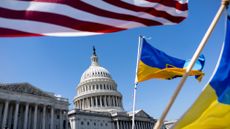 Ukraine cheers House approval of military aid
Ukraine cheers House approval of military aidSpeed Read Following a lengthy struggle, the House has approved $95 billion in aid for Ukraine and Israel
By Peter Weber, The Week US Published
-
 Olive oil: alternatives for the 'liquid gold'
Olive oil: alternatives for the 'liquid gold'The Week Recommends As the price of this store cupboard staple has rocketed, we look at ways to save and other oils to use for cooking
By Adrienne Wyper, The Week UK Published
-
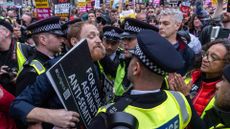 Scotland Yard, Gaza and the politics of policing protests
Scotland Yard, Gaza and the politics of policing protestsTalking Point Met Police accused of 'two-tier policing' by former home secretary as new footage emerges of latest flashpoint
By The Week UK Published
-
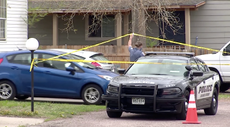 Gunman kills 6, himself at Colorado Springs birthday party
Gunman kills 6, himself at Colorado Springs birthday partySpeed Read
By Peter Weber Published
-
 Columbus police fatally shoots Ma'Khia Bryant, 16, quickly releases body-cam footage
Columbus police fatally shoots Ma'Khia Bryant, 16, quickly releases body-cam footageSpeed Read
By Peter Weber Last updated
-
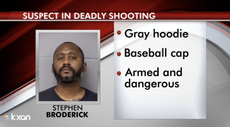 Austin police, feds searching for ex-sheriff's deputy accused of killing 3, in Sunday's 2nd mass shooting
Austin police, feds searching for ex-sheriff's deputy accused of killing 3, in Sunday's 2nd mass shootingSpeed Read
By Peter Weber Last updated
-
 At least 8 dead in Indianapolis FedEx shooting
At least 8 dead in Indianapolis FedEx shootingSpeed Read
By Peter Weber Last updated
-
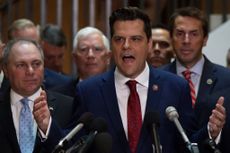 Scalise says GOP will 'take action' on Gaetz if DOJ moves ahead with 'formal' case
Scalise says GOP will 'take action' on Gaetz if DOJ moves ahead with 'formal' caseSpeed Read
By Catherine Garcia Last updated
-
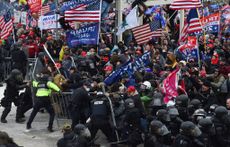 Watchdog report: Capitol Police knew about potential for violence on Jan. 6, but held back
Watchdog report: Capitol Police knew about potential for violence on Jan. 6, but held backSpeed Read
By Catherine Garcia Published
-
 Former classmate arrested in 1996 disappearance of college student Kristin Smart
Former classmate arrested in 1996 disappearance of college student Kristin SmartSpeed Read
By Catherine Garcia Published
-
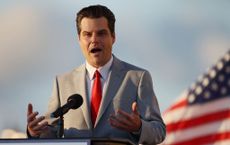 Report: Gaetz associate has been cooperating with federal investigators since last year
Report: Gaetz associate has been cooperating with federal investigators since last yearSpeed Read
By Catherine Garcia Last updated